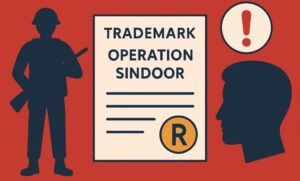A name, word, or symbol that distinguishes goods or services from those of other businesses can be a subject matter for Trademark registration in India under the Trademark Act, 1999. The Trade Marks Act, 1999 defines a “trademark” under Section 2(1)(zb) as – “a mark capable of being represented graphically and which is capable of distinguishing the goods and services of one person from those of others and may include the shape of goods, their packaging and combination of colours.”
Thus, it is a type of intellectual property which is denoted by visual representation in the form of signs, symbols, words, mark or a logo to distinguish one product/service from other. Though a Trademark registration isn’t mandatory in India, it is preferred to have the mark registered – that helps strengthen the case – if so required when any objection is faced in the future. Thus, an applicant, who claims to be the owner of a mark can apply for the registration of a Trademark by application in writing to the competent registrar in an authorised manner.
Registration of a mark ensures that those are legally protected and cannot or should not be used to misrepresent products or confuse consumers. In other words, trademark registration grants complete ownership to the registered owner of the mark.
Though the act doesn’t explicitly mention the grounds of satisfaction of which a trademark will be granted registration, it spells out the grounds for refusal of registration of a trademark. The Trademark Act, 1999 mentions two grounds for refusal of a trademark registration in India, and those are:
- Absolute grounds for refusal of registration (Section 9)
- Relative Grounds for refusal of registration (Section 11)
Table of Contents
ToggleAbsolute grounds for refusal of registration (Section 9)
Section 9 of the Trademark Act, 1999 lays down various conditions, which makes it a hard stop for getting a Trademark grant if the proposed mark is found to fulfil those conditions. The grounds are:
- Marks which are devoid of any distinctive character,
- Marks that are indications or marks that are used in commerce to define the quantity, quality, type, values, intended purpose, or geographical origin of goods or services rendered,
- Marks or indications which have become customary in the current language or in the bona fide and established practices of the trade, shall not be registered,
- Nature of the mark is such that it can deceive the public or cause confusion,
- The mark it contains or comprises of any matter likely to hurt the religious susceptibilities of any class or section of the citizens of India,
- If the mark comprises or contains scandalous or obscene matter,
- If the use of the mark is prohibited under the Emblems and Names (Prevention of Improper Use) Act, 1950 (12 of 1950),
- Marks resulting from the nature of the goods themselves,
- Marks that add significant value to the goods,
- Marks whose shape adds significant value to the goods.
These absolute grounds of refusal are related to the benefit of public policy – with the legislative intent to protect the legitimate interest of the traders as well as the public who are genuine and bona fide users of various marks in relation to their goods/services.
However, if a mark has acquired “distinctive character” over a period of time and has thus become a “well known trademark”, the same wont be refused for registration – given the fact that the applicant is able to prove the same.
Relative Grounds for refusal of registration (Section 11)
Section 11 of the Trademark Act, 1999 mentions the relative grounds for refusal for registration of a mark. If a mark is found to confuse public on account of a mark being identical or similar to an earlier trademark, the same won’t be allowed for registration under this section. Various other grounds which are listed under relative grounds of refusal are:
Section 11(1) states the following grounds for refusal:
- Trademarks which confuse the public as it is identical with an earlier similar trademark of goods or services.
- Trademarks which confuse the public as it is similar with an earlier identical trademark of goods or services.
Section 11(2) states the following grounds for refusal:
- Trademarks which would take unfair advantage of a similar or identical earlier well-known trademark in India.
- Trademarks which would be detrimental to the distinctive character or repute of a similar or identical earlier well-known trademark in India.
Section 11(3) states the following grounds for refusal:
- The usage of the trademark is bound to be prevented by the law of passing off protecting an unregistered trademark used in the course of trade.
- The usage of the trademark is bound to be prevented by the law of copyright.
However, if the applicant is able to prove ‘honest concurrent use’ of the proposed mark and an already registered mark, then the same may not be refused taking the umbrella of Section 12 of the Trademark Act.
Frequently Asked Questions
Why and when is trademark refused in India?
A Trademark application can get refused in India if the proposed mark falls under any of the categories of Absolute grounds of Refusal or Relative Grounds of Refusal. Any of the proposed mark that falls within the scope of Section 9 or Section 11 of the Trademark Act, 1999 which details about the grounds of Absolute and Relative grounds of refusal is ineligible for registration and holds the likelihood of getting refused.
What are the grounds of refusal of trademark section 9?
Section 9 of the Trademark Act, 1999 mentions about the Absolute grounds of refusal. Any of the proposed mark falling under any of the grounds as mentioned would stand ineligible for registration. The grounds are:
- Marks which are devoid of any distinctive character,
- Marks that are indications or marks that are used in commerce to define the quantity, quality, type, values, intended purpose, or geographical origin of goods or services rendered,
- Marks or indications which have become customary in the current language or in the bona fide and established practices of the trade, shall not be registered,
- Nature of the mark is such that it can deceive the public or cause confusion,
- The mark it contains or comprises of any matter likely to hurt the religious susceptibilities of any class or section of the citizens of India,
- If the mark comprises or contains scandalous or obscene matter,
- If the use of the mark is prohibited under the Emblems and Names (Prevention of Improper Use) Act, 1950 (12 of 1950),
- Marks resulting from the nature of the goods themselves,
- Marks that add significant value to the goods,
- Marks whose shape adds significant value to the goods.
What is descriptiveness refusal/rejection of trademark?
At the stage of office action, if the examiner believes that the proposed mark is merely descriptive about the goods or services with which it is to be associated, then they can reject/refuse it – that’s what is called descriptiveness refusal. For example, a merely descriptive mark is “CREAMY” for yogurt – it is merely descriptive based on the fact that it describes the nature of the product, i.e. yogurt that it is associated with.
This refusal finds its base from Section 9(1)(b) of the Trademark Act which states that “trade marks which consist exclusively of marks or indications which may serve in trade to designate the kind, quality, quantity, intended purpose, values, geographical origin or the time of production of the goods or rendering of the service or other characteristics of the goods or service, shall not be registered”.
The owner/proposer of such a mark has to be in a position to show that the mark in question though descriptive, in its true sense, has come to be associated solely with the company so as to over come the refusal/rejection.
What is provisional refusal/rejection in trademark?
Refusing/rejecting a trademark application on a provisional basis is termed as provisional refusal/rejection. This is the notification issued by the Indian trademark office when there are issues or concerns with an international trademark application filed through the Madrid Protocol that designates India. It refers to the initial objection or refusal issued by an individual national trademark office (known as the “Office of Origin”).
Once a Provisional refusal is issued, the applicant is required to respond and address the objections raised by the national trademark office.





